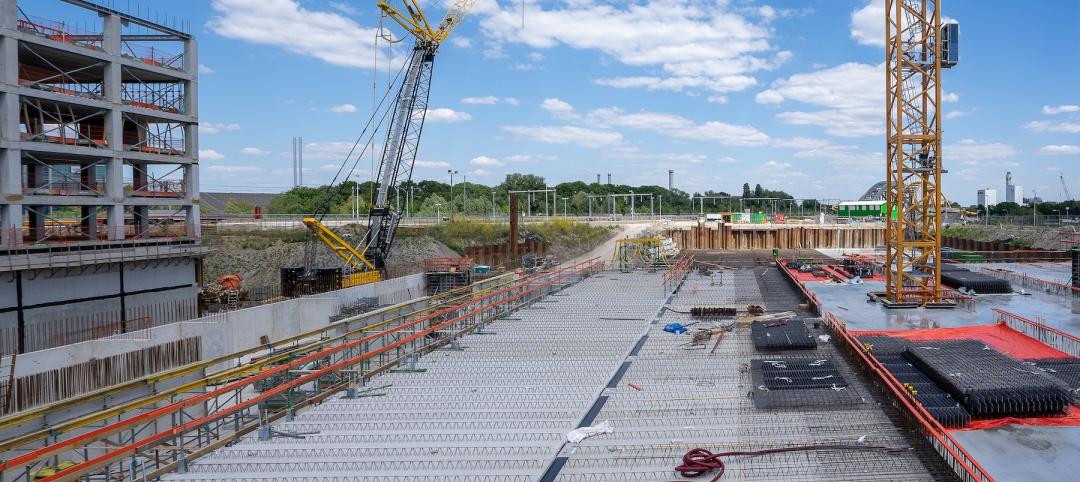CoreNet Global, a major international association for corporate real estate and workplace executives, has released a public policy statement advocating adoption of net-zero energy buildings: "We support the principle that smart and responsible energy policies and practices reduce corporate carbon footprints and greenhouse gas emissions, and we encourage our members' companies to drive energy efficiency to optimal levels with net-zero buildings as a top measure of long-term success."
The same statement calls on federal governments around the world to incentivize building owners, investors, and occupants who proactively reduce their carbon footprints through the use of green energy development and retrofits.
"Office, industrial, retail and other types of commercial real estate account for 40% of the world's annual energy consumption, making energy management and energy conservation socially responsible corporate practices," says CoreNet Global Chairman Jim Scannell, Senior Vice President of Administrative Services at The Travelers Companies, Inc.
The statement emphasizes "tangible benefits for companies and management teams which prioritize energy efficiency and take steps to reduce the carbon footprint. They will realize meaningful return on investment financially, socially and environmentally—as is consistent with the principles of the Triple Bottom Line accounting model."
CoreNet Global's Issues Advocacy Focus Group coordinated the wide-ranging statement based on extensive input from subject matter experts and the extensive, long-term documentation of best-in-class energy management practices from among its more than 7,900 members worldwide. It also marks the first time that corporate occupiers representing the demand side of the commercial real estate industry have spoken with a unified voice to advocate for public policy issues and corporate practices that impact business and society. In its 2012 Industry Leaders Opinion Poll, 90% of CRE executives who responded regard energy management as the most urgent issue facing the CRE industry.
"We're beginning to see the huge environmental, social and economic benefits that energy-independent facilities are offering," Scannell added.
A related finding from CoreNet Global's new Corporate Real Estate 2020 research initiative identifies one key enabler of the migration toward net-zero, predicting that buildings will become energy-producing "micro-grids" that can share electric power across public and private distribution networks.
Key action steps advocated for developers include articulating a clear and compelling vision for energy efficiency; working with energy suppliers and other pieces of the supply chain; and continuously measuring consumption and performance. Government programs advocated include tax deductions for energy-efficiency projects; a federal loan guarantee program for retrofits; state and local incentives that favor efficiency upgrades or retrofits; and updated building codes that reward companies for peak performance.
(http://bit.ly/UJe2Wb)
Related Stories
Justice Facilities | Oct 17, 2022
San Antonio’s new courthouse aims to provide safety and security while also welcoming the public
The San Antonio Federal Courthouse, which opened earlier this year, replaces a courthouse that had been constructed as a pavilion for the 1968 World’s Fair.
Market Data | Oct 14, 2022
ABC’s Construction Backlog Indicator Jumps in September; Contractor Confidence Remains Steady
Associated Builders and Contractors reports today that its Construction Backlog Indicator increased to 9.0 months in September, according to an ABC member survey conducted Sept. 20 to Oct. 5.
| Oct 13, 2022
Boston’s proposed net-zero emissions code has developers concerned
Developers have raised serious concerns over a proposed new energy code by the City of Boston that would require newly constructed buildings over 20,000 sf to immediately hit net-zero emissions goals.
Education Facilities | Oct 13, 2022
A 44-acre campus serves as a professional retreat for public-school educators in Texas
A first-of-its-kind facility for public schools in Texas, the Holdsworth Center serves as a retreat for public educators, supporting reflection and dialogue.
Building Team | Oct 12, 2022
Real estate development practices worsened impact of Hurricane Ian
A century ago, the southwest Florida coast was mostly swamps and shoals, prone to frequent flooding and almost impossible to navigate by boat.
Market Data | Oct 12, 2022
ABC: Construction Input Prices Inched Down in September; Up 41% Since February 2020
Construction input prices dipped 0.1% in September compared to the previous month, according to an Associated Builders and Contractors analysis of U.S. Bureau of Labor Statistics’ Producer Price Index data released today.
Hotel Facilities | Oct 12, 2022
Global hotel chain citizenM opens its first Chicago property and its fifth of the year
citizenM, a global chain of affordable luxury hotels, has opened its first Chicago property—its fifth opening of 2022.
Standards | Oct 11, 2022
Peter Templeton named new USGBC and GBCI president and CEO
The U.S. Green Building Council (USGBC) and Green Business Certification Inc. (GBCI) appointed Peter Templeton as president and CEO.
Legislation | Oct 10, 2022
Chicago’s updated building energy code provides incentives for smart HVAC, water appliances
The Chicago City Council recently passed the 2022 Chicago Energy Transformation Code that is intended to align with the city’s goal of reducing carbon emissions by 62% from 2017 levels by 2040.
Contractors | Oct 7, 2022
Nonresidential construction spending down 0.4% in August, says ABC
National nonresidential construction spending was down 0.4% in August, according to an Associated Builders and Contractors analysis of data published today by the U.S. Census Bureau.

















